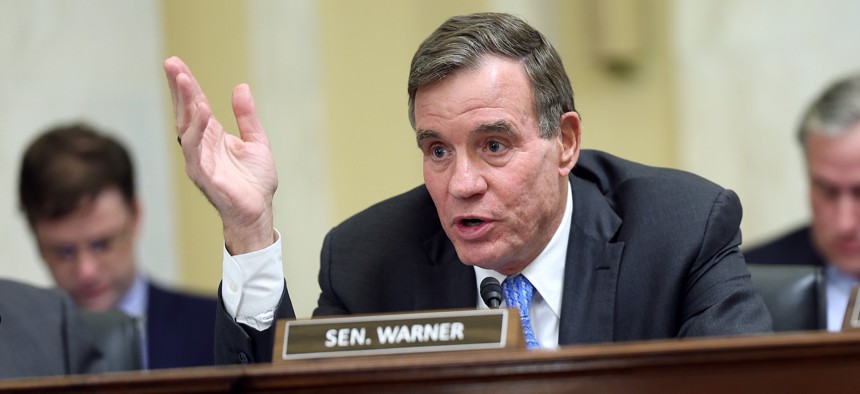CISA is still maintaining radio silence with social media as Super Tuesday kicks off

Virginia Democrat Sen. Mark Warner, shown here at a November 2023 hearing, says that the Biden administration has been "too timid" in its reading of court rulings around federal agency contacts with social media companies. Kevin Dietsch/Getty Images
The lack of communication stems from an ongoing Supreme Court case that one top senator says Biden administration lawyers have been “too timid” in addressing.
The Cybersecurity and Infrastructure Security Agency has not detected any specific or credible threats to Super Tuesday election infrastructure, though the agency has not been in touch with social media firms about election security specifics, according to a senior CISA official that briefed reporters as primary elections polls opened up around the country.
The lack of communication with social media companies is likely linked to a pending Supreme Court case that would consider whether Biden administration agencies have the ability to stay in contact with social media companies about removing posts that could contain disinformation.
The litigation, Murthy v. Missouri, was fueled by allegations that agencies like CISA were unfairly pressing for the removal of content related to vaccine safety and election results from the 2020 presidential election.
The senior CISA official declined to comment on the case, but said that they are still actively scanning for AI-fueled cyber influence efforts — a widely dreaded election security scenario this year that is anticipated to target major social media platforms.
“We've put in a lot of efforts … focusing on the increased risk posed by generative AI capabilities in this space. That’s been a priority threat vector that we’ve focused on over the past several months to try to encourage election officials across the country to understand the threat and the steps they can take to mitigate against it,” the senior official said.
Sen. Mark Warner, D-Va., who chairs the Senate Intelligence Committee, told Nextgov/FCW on the sidelines of a Tuesday Professional Services Council event that various cyber and intelligence agency officials have told him in testimony that their respective agencies have not been in touch with social media firms since July.
The Supreme Court late last year permitted the Biden administration to continue communications with social media for now while the case is still pending, but Warner said that administration lawyers have been “too timid” in their legal interpretation, a dynamic that may cripple election security in November.
“I think they are now changing that legal guidance because we will be going in blind to the 2024 elections when foreign nations will try to manipulate our elections through misinformation and disinformation,” Warner said. “ The whole basis of the [original] case in the Fifth Circuit was somehow that the government was going to intimidate free speech. Well, this is not a forced conversation, these are voluntary conversations,” he added.
CISA said Monday it was coordinating with state and local partners, as well as private sector representatives about information sharing for Super Tuesday. The principal federal agency that helps oversee election security said the initiative would monitor primary elections across the U.S. amid heightened concerns about how nation-state hackers and other domestic threats could interfere with election infrastructure and other methods that track electoral information.
Officials fear that a loss of faith in electoral systems at home could lead to a repeat of the widespread voter fraud claims that occurred during the 2020 presidential election and ended in the January 6 attack on the U.S. Capitol.
On the domestic front, content moderator staff reductions at social media companies have also been deemed a major risk to election integrity, and election workers worry they will face threats of violence from voters who don’t accept the polling results.
Election interference risks are not as novel as when they were first reported nearly a decade ago, but officials and researchers fear that consumer-facing AI tools or similar offerings available on the dark web will supercharge hackers’ attempts to breach election infrastructure or craft realistic-sounding social media campaigns that seek to sway voters away from the polls or instill distrust in election outcomes.
U.S. voters got a taste of this in January when a Texas-linked robocalling operation allegedly disseminated phone calls featuring an AI-generated voice of President Joe Biden during the New Hampshire primary, urging Democrats to “save” their votes for the November ballot. The fallout ended in a total ban on AI voices being used in robocall schemes in the U.S, led by the Federal Communications Commission.
NEXT STORY: IRS Direct File to be fully available March 12






